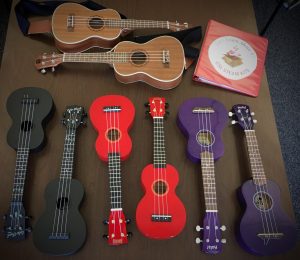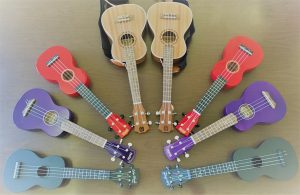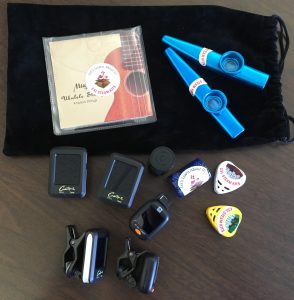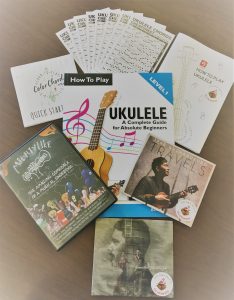Music programs are a great way to introduce low-cost STEAM programs into your library. Many libraries engage their communities through unorthodox, hands-on programming that teaches STEAM principals. Music education obviously taps into the Arts, but there are also mathematical principals that underline all instruments and composition. Music is used every day for self-expression, entertainment, religion, therapy, forging personal connections and inspiring every kind of emotion. Music teaches us to listen carefully. It’s also an activity that builds community in a way that can appeal to diverse groups of people.
Contents
1 2” red resource kit binder containing:
- 1 book (How to Play Ukulele: A Complete Guide for Absolute Beginners, 9781908707086)
- 2 blue kazoos and cleaning wipes
- Picks (including 2 pick holders, 1 white, 1 yellow)
- Replacement strings
- 2 finger shakers, one black, one blue
- 8 4”x6” Ukulele Chords Cheatsheets
- 2 Kala quick start guides: “Learn to Play Ukulele”
- 2 white booklets: “How to Play Ukulele”
- Contact tuner manuals (in sheet protector)
8 ukuleles in assorted cases:
- 2 Lightwish mahogany concert ukuleles (with straps attached)
- 2 black Kala Color Chord ukuleles
- 2 red Mahalo ukuleles
- 2 purple Hola! ukuleles
1 24”x36” popular ukulele chords poster (in poster tube)
2 CDs (The Old Silo by James Hill and Travels by Jake Shimabukuro)
1 DVD (Mighty Uke: The Amazing Comeback of a Musical Underdog documentary)
1 black velvet bag containing 5 black contact tuners
Audience
This kit is designed to be used by library staff who may know next to nothing about music themselves. Staff can use their preparation time to learn the basics, or find a musician in their community to teach a program.
The materials in this kit are primarily for aspiring musicians, ages 9 and up. Adults and children who want to learn to play an instrument will be able to dip their feet into the world of music and have fun making noise in the library.
Resources
Example music lending library: https://www.bklynlibrary.org/locations/central/musicloan
Websites
- UkuleleSongs.com – https://www.ukulelesongs.com/
- Free tabs and sheet music, including many popular songs.
- EasyUkulele.com – http://www.easyukulele.com/
- Free video lessons, including some that teach popular songs.
- The Ukulele Site – https://www.theukulelesite.com/free-resources
- Free videos, beginner tutorials. Advanced tutorials. Instrument reviews and care guides. Free sheet music and tabs.
Apps
There are many apps available for iOS and Android for ukulele learners. Some online research and testing can tell you which app has the best features for you and your patrons.
Podcasts
- NPR’s All Songs Considered – https://www.npr.org/podcasts/510019/all-songs-considered
- From the website: “Hosts/nerds Bob Boilen and Robin Hilton are your friendly music buddies with the week’s best new music discoveries, including conversations with emerging artists, icons and more. Hear songs that can completely change your day, with humor, heart and (sometimes) a whole lot of noise.”
- Song Exploder – http://songexploder.net/
- From the website: “Song Exploder is a podcast where musicians take apart their songs, and piece by piece, tell the story of how they were made. Each episode is produced and edited by host and creator Hrishikesh Hirway in Los Angeles. Using the isolated, individual tracks from a recording, Hrishikesh asks artists to delve into the specific decisions that went into creating their work. Hrishikesh edits the interviews, removing his side of the conversation and condensing the story to be tightly focused on how the artists brought their songs to life.”
- Switched on Pop – http://www.switchedonpop.com/
- From the website: “A podcast about the making and meaning of popular music hosted by musicologist Nate Sloan and songwriter Charlie Harding. We break down pop songs to figure out what makes a hit and what is its place in culture. We help listeners find ‘a-ha’ moments in the music. Switched on Pop will make you laugh, dance, and ask ridiculous questions like: does the falsetto in One Direction’s ‘What Makes You Beautiful’ essentially make them our modern day Castrati?”
Books
- Ukulele in the Classroom series http://www.ukuleleintheclassroom.com/
- Book series for both teachers and students. Great if you plan on a deeper dive into this type of programming, or if you just want to learn for yourself.
- How Music Works: The Science and Psychology of Beautiful Sounds, from Beethoven to the Beatles and Beyond, By John Powell; 978-0316098311
- This is an excellent often funny guide to the foundations of sound and music for adult learners. His style is very accessible, and you may find that certain chapters form perfect jumping-off points to shaping your own STEAM programs. I especially suggest chapter 11 “Making Music” for adult learners interested in mastering an instrument.
- Help Your Kids With Music: A Unique Step-By-Step Visual Guide – DK Publishing; 978-1465436047
- Like all DK books, there are plenty of visuals and these materials about the basics of music theory are broken down into short pieces that could each be a lesson in themselves. There is also a CD for audio demonstrations of the concepts, a great help for non-visual learners.
YouTube
“The first 20 hours — how to learn anything” by Josh Kaufman at TEDxCSU – https://www.youtube.com/watch?v=5MgBikgcWnY
Description: “Josh Kaufman is the author of the #1 international bestseller, The Personal MBA: Master the Art of Business, as well as the upcoming book The First 20 Hours: Mastering the Toughest Part of Learning Anything. Josh specializes in teaching people from all walks of life how to master practical knowledge and skills.”
Colorado-specific music resources
Bringing Music to Life
http://www.bringingmusictolife.org/#sthash.MQgO02QI.ldnhPVuh.dpbs
A Colorado-based nonprofit that collects donations of money and musical instruments for schools. They believe that teaching music is valuable because “In addition to learning the value of teamwork, listening skills improve, along with critical thinking, self-discipline and self-esteem. Children become better students and more creative, compassionate people.”
Learn more about them in a Colorado Public Radio article from February 2018: “Instrument Drive Inspires New Sounds at Small Colorado School” (http://www.cpr.org/classical/story/instrument-drive-inspires-new-sounds-at-small-colorado-school).
Colorado State Music Teachers Association (CSMTA)
http://www.comusicteachers.net/
Affiliated with the Music Teachers National Association, Inc., “The Colorado State Music Teachers Association exists to encourage and advance the standards of teaching and performance, to enhance the professional status of its members, to provide a collegial and fraternal relationship among its members, and to foster the advancement of music education in Colorado through relationships with schools and community organizations” (from their website).
For Inspiration
Jake Shimabukuro
https://www.jakeshimabukuro.com/home/
A professional ukulele player & ukulele advocate. Multiple TED Talks available online (https://www.ted.com/). YouTube channel: https://www.youtube.com/user/jakeshimabukuro
James Hill
https://www.jameshillmusic.com/
A professional ukulele player & singer/songwriter. Site includes videos of his unorthodox methods, which include using chopsticks and combs. In a few videos, he even adds the kazoo. YouTube channel: https://www.youtube.com/channel/UC1Y9jKaN4WrwGIbfxkyzlVA
Other artists
- Honoka & Azita, https://www.honokaandazita.com/
- Israel Kamakawiwo’ole, album Somewhere Over the Rainbow: The Best of Israel Kamakawiwo’ole
- Taimane Gardner, albums Ukulele Dance and We are Made of Stars, https://taimane.com/
Additional Resources/Courses
https://www.johnnymercerfoundation.org/app/uploads/2021/12/Franco_Beginning_Ukulele.pdf
https://www.justinguitar.com/modules/ukulele-beginner-course
https://www.ukuleleintheclassroom.org/teaching-tools
https://www.ukeanbehappy.org/lesson-plans.html
http://ukuleletonya.com/files/beginner_lesson_pkg.pdf




